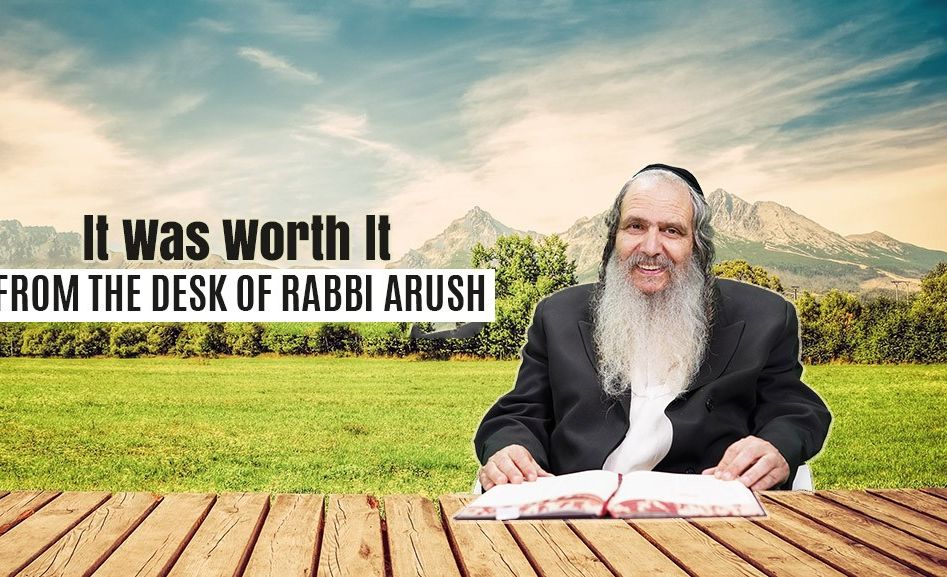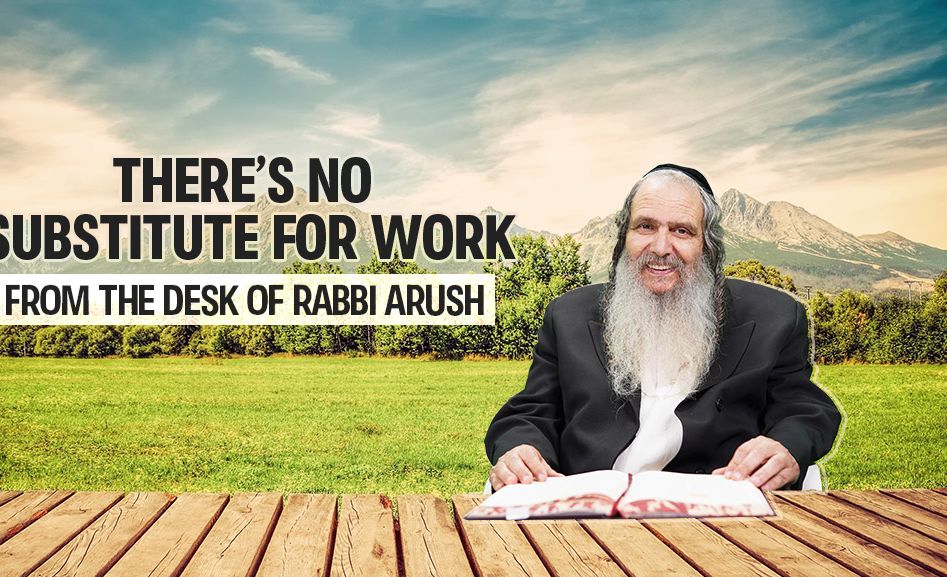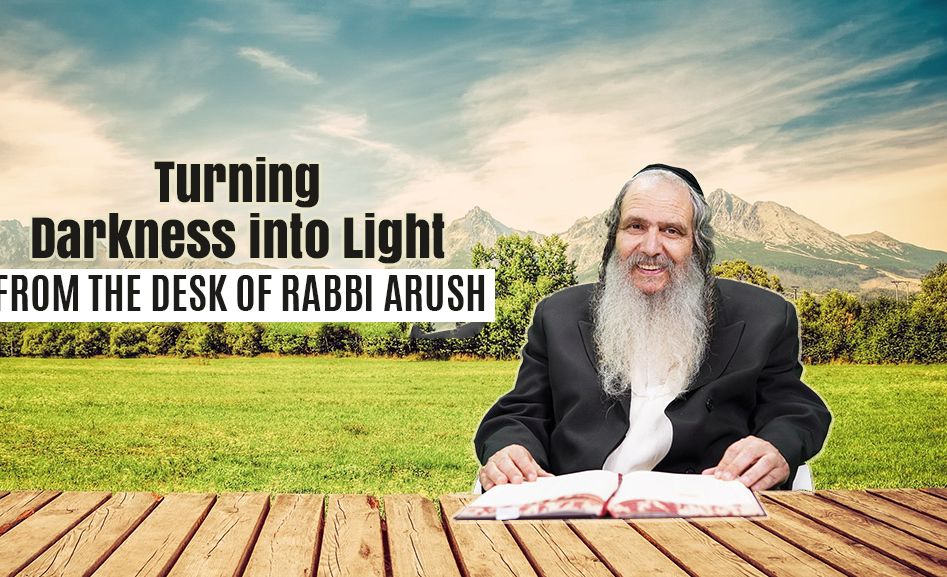
You Can Return!
Let us always remember that no matter what sins a Jew might have done, no matter how far he might have drifted from Torah and mitzvot, he still has a pure and holy soul. We must never give up on him! Rather, we must pray for him and encourage him in every way.

“And say to them: Let none [of you] defile for a soul among his people.” (Vayikra 21:1)
Helping Every Jew
Whenever you see a Jew who is struggling with his Yiddishkeit and has drifted from the just path of Torah and mitzvot, it is appropriate that you exhaust every effort to try and save him, regardless of how far he may have fallen.
An aspect of this effort is davening. You need to daven for this wayward person to be inspired to return to Hashem through heartfelt and sincere teshuva. This can help any Jew.
Chazal relates in Brachot (10a) that a few wicked individuals were causing R’ Meir tremendous anguish. And he davened that they should die, until his wife, Bruria said to him, “Don’t daven that the wicked should perish. Rather, you should pray that they repent and do teshuva. ”
R’ Meir agreed, and he davened that each of these wicked men should do teshuva. And so, it was.
The Fruit Beyond the Peel
Unfortunately, people do not always adhere to this principle. They do not try to help a Jew who is struggling with their Yiddishkeit or who has completely abandoned a Torah life. Rather, they accept that this person simply cannot change.
They believe what therapists and psychologists espouse: this person is consumed by uncontrollable desire, and he cannot be helped. Instead of doing everything within their power to help this Jew return, they give up on him.
Chazal taught (Eruvin 19a) that even “the wicked Jews are full of mitzvot like a pomegranate (is full of seeds).” From the outside, a pomegranate seems dry and tasteless. However, beyond that hard exterior is a delicious fruit full of sweetness, flavor, and taste.
There are Jews who, like the pomegranate, seem “dried out” and void of any goodness. However, that is not the case. Beyond those exterior layers, infused in the heart of every Jew is a neshama (soul) that is holy, precious, and literally a portion of Hashem. All we must do is remove that hard shell created by indulging in physical desires, and then those immeasurable spiritual strengths can be revealed. Then the person can transcend to new spiritual heights through the performance of mitzvot.
Always a Jew
Chazal taught (Sanhedrin 44a) that even when a Jew sins, he remains a Jew.
The Seforim HaKedoshim explain that even if a Jew continuously sins, he is, nevertheless, a Jew, because there is a spark of holiness in every Jew that remains unscathed or impacted by those sins. The neshama remains intact and pure. And, that powerful source of spiritual energy can be unleashed at any time, fueling this Jew’s return to Hashem and the rectification of his past through teshuva. No matter how far a person sinks into the impurities of this world, he can always return.
Hashem instills this holiness into the soul of every Jew, even when they are behaving in impure ways and sinning.
The Gemara relates (Yuma 57a) that there was a certain Sadducee that commented to R’ Chanina, “When the Jews are in exile, they are clearly impure. As it says (Eicha 1:9), ‘Her impurity was in her skirts…'”
R’ Chanina responded, “The Torah tells us (Vayikra 16:6), ‘That dwells with them in the midst of their impurity…’ This teaches us that even when the Jews are impure, the Shechinah dwells among them.”
R’ Avraham Dov of Ovrutch, the Bad Ayin, zt”l, said: If a Jew does not believe that Hashem is close to him and wants his Avodat Hashem even after committing the most severe transgressions – as it says that Hashem “dwells with them in the midst of their impurity – then this Jew is a heretic.”
Similarly, R’ Moshe from Kovrin, zt”l, said, “Whoever is unable to stand in prayer before his heavenly Father after committing the gravest transgression, and pour out his heart in prayer like a son who sins before his Father, has not yet set foot on Judaism’s doorstep.”
The pasuk says (Devarim 31:17), and they will say on that day, “Is it not because our God is no longer in my midst, that these evils have befallen me? “… R’ Simcha Bunim of Peshischa, zt”l, explained that when the Jews say “our God is no longer in my midst” this is the sin that leads to all of these troubles and hardships. This is an expression of despair. They no longer recognize the holiness that is within themselves, the soul that Hashem and planted deep in their inner being. This despair leads to depression, laziness and hopelessness. Without realizing their potential, they give up on themselves.
Therefore, it is critical that every Jew constantly remind himself of this inescapable truth. He must always remember that no matter what sins a Jew might have done, no matter how far he may have drifted from the path of Torah and mitzvot, he still has a holy neshama.
Like a “Segol”
The pasuk teaches us (Shemot 19:5), you shall be to Me a treasure (Heb. Segulah) out of all peoples..
R’ Dovid of Leluv explained that a Jew is like the Hebrew vowel “Segol” which looks like this:
No matter which way you turn the vowel, it always remains a Segol. It cannot lose its shape. So, too, the Jewish people are a Segulah, a treasure. No matter how far a Jew distances himself from Torah and mitzvot, no matter how turned upside down his spiritual life has become, he remains a Jew.
R’ Yechiel from Aleksander, zt”l, explained that this was Yitzchak’s message to Yaakov when he said (Bereishit 27:27), the fragrance of my son is like the fragrance of a field… When someone dumps garbage into a field, there is a horrible odor that emanates from the trash. However, the pleasant smell of the actual field is not ruined. It is merely being masked by the garbage now. When the garbage is removed, the smell will go with it and the naturally pleasant smell of the field will return. The same is true of the powerful holiness of a Jew’s neshama. Even when he has drenched himself in the stench of sin, the “smell” of his holiness has not been impacted. And, when he does teshuva and cleanses himself of that putrid smell, the sweetness of his soul will radiate once again.
My holy ancestor R’ Eliezer Tzvi from Komarna, zt”l, mentions in his work Zekan Beiso, that he heard from his father, R’ Yitzchak Isaac from Komarna, zt”l, a story about one Baal Teshuva. This person tried his hardest to tempt Hashem’s Wrath by transgressing every sin in the Torah. However, in the end, he returned to Hashem through teshuva, and he achieved remarkable spiritual heights. The Apta Ruv, zt”l, met this person and commented that he had a tremendous spiritual stature and had even reached levels in spirituality that even the Apta Ruv had not attained.
We see this today as well. There are Jews who lived their lives pursuing sin and indulging in all temptations. And, when they do teshuva, they achieve incredible spiritual heights despite how they might have behaved in the past.
The Kohanim Cannot Give Up
One aspect of the Kohanim’s role was to inspire the Jews to do teshuva. Our pasuk here is providing guidance to them.
Our pasuk instructs them: “Let none [of you] defile for a soul among his people“… Meaning, they should not think that any Jewish soul is completely impure. They cannot think that they are helpless, and that teshuva is beyond their reach.
They must know that every Jew’s soul remains pure and holy. And there is a powerful potential hidden beneath the external layers that, once unleashed, can inspire any Jew to do teshuva and return to Hashem fully and completely.
***
The Kalever Rebbe is the seventh Rebbe of the Kaalov Chasidic dynasty, begun by his ancestor who was born to his previously childless parents after receiving a blessing from the Baal Shem Tov zy”a, and later learned under the Maggid of Mezeritch zt”l. The Rebbe has been involved in outreach for more than 30 years and writes weekly emails on understanding current issues through the Torah. Sign up at www.kaalov.org.







Tell us what you think!
Thank you for your comment!
It will be published after approval by the Editor.